Explore Pakistan, the land unknown to many
My Travelogue of Pakistan
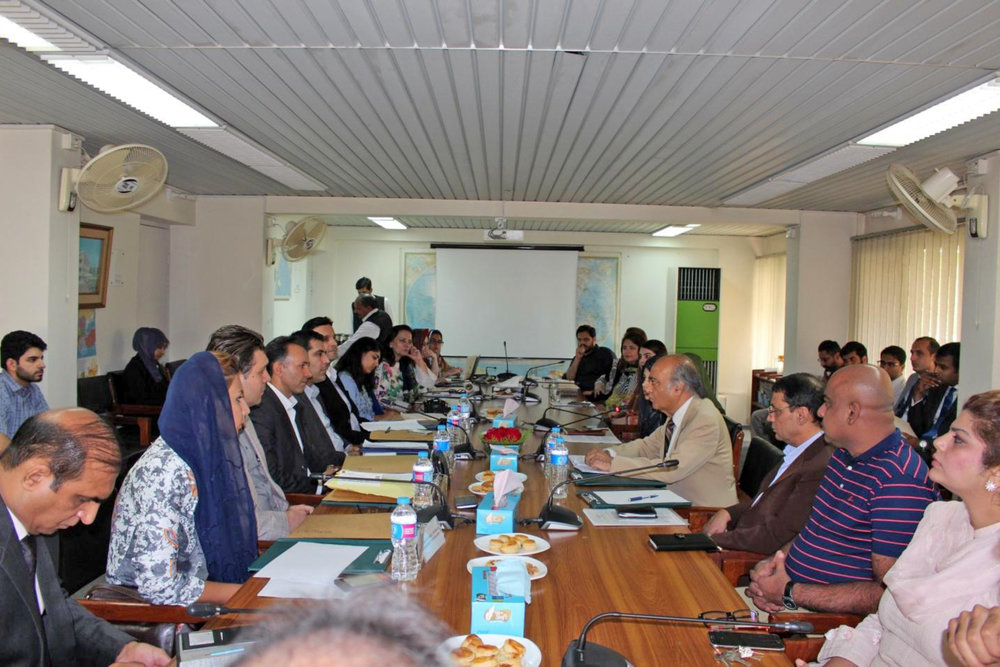
When I was told by my superiors to make a journey to Pakistan, I started wondering how traveling to our neighboring country could be. Soon after, I made up my mind to perceive the country objectively and feel it personally, not in the way some mainstream media portray it.
Moreover, I’d always heard about the commonality of both nations in religion, culture and social issues.
Accompanied by four other reporters, I arrived in Islamabad International Airport in the early hours of September 18.
The six-day journey was at the invitation of the Institute of Strategic Studies Islamabad (ISSI), with wide variety of meetings and visitations on a packed schedule.
At the airport, we were well-received by a very energetic and kind-hearted gentleman named Ashfaq Ali, our guide and coordinator who professionally accompanied us until the last minute of the journey.
Adjacent to the gate was a tiny mosque with two minarets, one in Pakistan and the other in the Afghan soil.
Our two right-hand drive cars sandwiched by security forces escorted us to our hotel, where we were warmly welcomed by the staff.
Islamabad is a modern and a well-designed city built according to a carefully organized plan. I saw ubiquitous grids of clean, tree-lined streets with trucks and buses that were uniquely hand-painted and decorated using an exciting and vibrant ‘folk art-form.’ In addition, I encountered many welcoming faces.
Roundtable at Institute of Strategic Studies Islamabad was real essence of my trip to Pakistan
The Institute of Strategic Studies Islamabad, ISSI, was our first destination in the Pakistani capital. Upon our arrival at the institute, we were warmly received by Ambassador Khalid Mahmood, the chairman and director general of the entity, who introduced us to his staff for friendly chats.
Khalid Mahmood reminded attendees of deep-rooted affinities and commonalities of the two nations in terms of language, culture, history and a common lengthy border line.
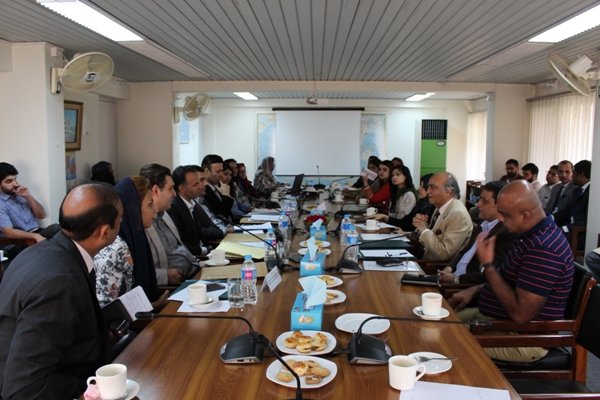
Officials of the Institute of Strategic Studies Islamabad in talk with Iranian media delegation, September 18, 2017.
He mentioned that Iran was first to recognize Pakistan, while Pakistan was one of the first countries to recognize the Iranian government after the 1979 Islamic Revolution. The ISSI chief added that both states share a mutual stance on regional cooperation as well.
Being a foodie, I fell in love with Pakistan’s rich cuisine that has so much in common with ours in Iran, excluding their extravagant use of the pepper.
As the Tehran Times journalist, I put forward questions to him concerning mechanisms to stabilize the region particularly in Afghanistan, and ways to counter terrorism and extremism. I then asked about the status que in Tehran-Islamabad trade relations which have been overshadowed by U.S.-led sanctions and subsequent banking problems as well as possible ways to spur it.
Ambassador Mahmood pointed to the tough times when Islamabad and Tehran had completely divergent policies towards Afghanistan, saying Tehran-Islamabad relationship has been so strong that neither side broke diplomatic relations.
“Today, both countries have a similar approach towards the situation in Afghanistan; now they believe there is a need for a political settlement in Afghanistan.”
He accentuated the need for developing a regional approach that leads to a peaceful solution in Afghanistan. Highlighting harmful role assumed by foreigners in the region, the veteran politician said the U.S. is seeking a military solution to the Afghanistan crisis which inevitably creates a recipe for continued conflict.
He pointed out that currently the U.S. is trying to give India a greater role in Afghanistan that may prompt to greater problems for Pakistan.
With regard to the outburst by President Donald Trump against Pakistan while declaring his administration’s policy towards Afghanistan and South Asia, Khalid Mahmood said Pakistan completely rejects the remarks Trump made. It is merely a blame game by the U.S. to conceal its own failures in Afghanistan.
Ambassador Mahmood asserted that there are both internal and external factors contributing to the present situation in Afghanistan, noting Pakistan believes this is not a time to enter into such a blame game, and instead all should put their efforts into resolving the issue.
Earlier in August, Trump accused Pakistan of providing “safe havens to terrorist organizations” and warned Islamabad it had much to lose by supporting insurgents battling the U.S.-backed Kabul government.
Ambassador Mahmood asserted that there are both internal and external factors contributing to the present situation in Afghanistan, noting Pakistan believes this is not a time to enter into such a blame game, and instead all should put their efforts into resolving the issue.
“A political approach is needed. There is a need to have national reconciliation in Afghanistan and a peaceful settlement among all parties. It is not possible to exclude the Afghan Taliban. Pakistan’s role is not to interfere but to facilitate a political settlement that is Afghan-owned and Afghan-led.”
On ways the Afghan Taliban can be involved in peace talks, he said that Tehran has influence on the Afghan government, so Iran should be using its clout to persuade Afghans to do so.
Ambassador Mahmood also said that the situation in Afghanistan has gotten mixed with the scourge of terrorism, and this entails cooperation among the regional countries to fight it.
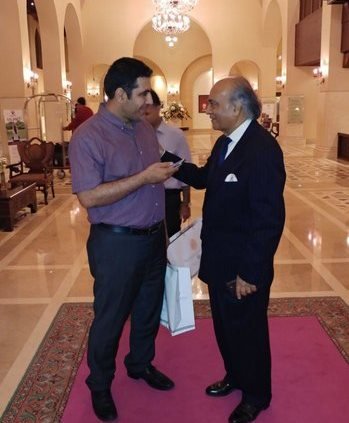
Ambassador Khalid Mahmood talks to the Tehran Times correspondent at Islamabad Serena Hotel, September 18, 2017.
He also blamed criminal elements for tragic incidents which happens once in a while along Pakistan-Iran border lines. He suggested the solution for this lies in collaborative measures by employing existing mechanisms in order to keep such nefarious activities under control.
When asked about bilateral trade relations and a possible preferential trade agreement, the ISSI director responded that economic cooperation is currently not on a par with the level of political ties and it is necessary that a free trade agreement be put into effect.
Both countries also need to facilitate the visa process, he added.
All in all, my travel to Pakistan was a once in a life time opportunity, one that I am extremely grateful for as I met extremely hospitable Pakistanis whom I will always remember for the rest of my life.
In fact, Ambassador Mahmood said, there are no critical problems to impede commercial ties. “There is no problem in terms of geographical distance; the means of transport and communication are already in place that translates to ideally, the trade level should be boosting, particularly with the resumption of freight train services between the two countries.”
He said one of the main hurdles in promotion of Pakistan-Iran ties is banking limitation which have their origins in sanctions imposed by the U.S. before the conclusion of the nuclear deal. “Much work has already been done in this respect and both countries need to move towards establishing branches of their banks in each other’s capitals.”
In response to another question about the fate of Iran-Pakistan gas pipeline, he explained that because of the U.S.-led sanctions, banks and other investors were not willing to invest in this venture on the Pakistani side, but now that the sanctions are easing, there is hope that more investors will be drawn.
A brief visit to the Associated Press of Pakistan
After saying farewell to the ISSI, we made our way to the Associated Press of Pakistan (also known as the APPC), a premier news agency where its director, editors and other staff received us with open arms and smile.
We exchanged views on prospects of media collaboration, ways to deepen cooperation, implementation of some previously-inked memorandums of understanding, journalist exchange programs and training courses.
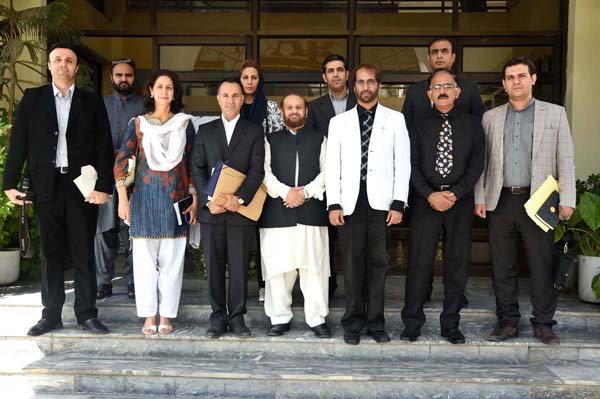
Posing for a photo with the authorities of the Associated Press of Pakistan, September 18, 2017.
APPC Executive Director Sohail Ali Khan briefed the delegation about performance, objectives, and future projects of the news agency, saying the agency is pledged to release authentic and credible reports for the readers. He accentuated each news piece is released only when it is confirmed by reliable sources.
Ali Khan reminded attendees of strong bonds the two countries share, saying Pakistan and Iran are enjoying historical relations which can be further strengthened through joint ventures in the field of media.
We exchanged views on prospects of media collaboration, ways to deepen cooperation, implementation of some previously-inked memorandums of understanding, journalist exchange programs and training courses.
Elsewhere in his remarks, the executive director pointed to a number of initiatives pursed by the APPC, such as developing e-magazine and web TV.
He added that the news agency is taking a pivotal role in promoting a soft image of the country through highlighting stories, concerning economic development and giving priority to national interests.
Time to reconnect with Iran’s soil in Islamabad
Before departing Islamabad for Quetta we paid a visit to the Iranian embassy as Ambassador Mehdi Honardoost had already accepted our request for a meeting and interview.
During the meeting-cum-breakfast the envoy briefed us on the growing ties in economy, trade and culture amongst other arenas between the two neighboring countries. Honardoost faulted “lack of information” about each country’s potential for further expansion of trade.
“One of the factors which has kept ties between Iran and Pakistan below the expectation level is the lack of information and enough knowledge about each other,” the ambassador said.
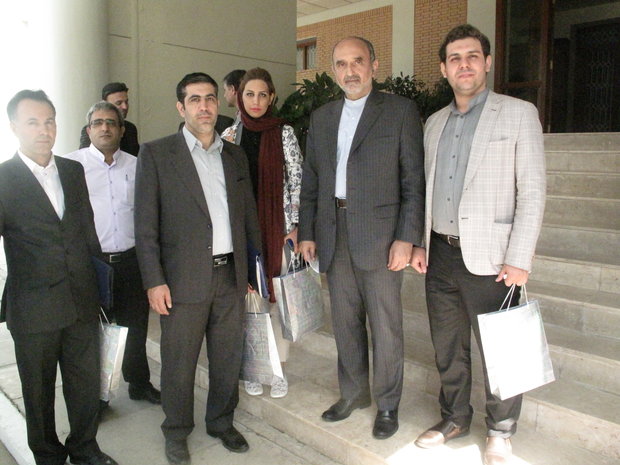
Ambassador Mehdi Honardoost (2nd R) encircled by the Iranian media delegation poses for a photo at the premises of the Iranian embassy in Islamabad on September 20, 2017.
“The fondness of the people of Pakistan for Iranians is a treasure that makes it easy to exploit the existing capacities in their relationship. In fact, with the removal of hurdles which had been imposed due to external factors on bilateral ties, mutual fondness as an active motive will pay off and we will witness further boost and expansion of ties in all the dimensions.”
Honardoost reminded us about lots of commonalities between the two nations in terms of culture, literature, history, civilization, religion, custom along with a 900-kilometer joint border as factors creating unbreakable bonds.
“The embassy of the Islamic Republic of Iran in Pakistan has made efforts to boost ties in economic and trade fields. The value of trade has spiked to around ½ billion U.S. dollars; the bulk of this figure is the share of Iran’s exports to Pakistan.”
In an exclusive interview with the Tehran Times, the ambassador also told what steps he has taken to deepen ties between the two states ever since he assumed office.
“Ties between Iran and Pakistan are very important; so effective steps have been made to further boost ties in all spheres. An indicator to that is the rising number of exchange visits by authorities of both countries including political, economic and military officials, he said adding “During my tenure of responsibility in Pakistan, H.E. Hassan Rouhani, the Iranian president, twice visited Pakistan by leading high level delegations.”
“The embassy of the Islamic Republic of Iran in Pakistan has made efforts to boost ties in economic and trade fields. The value of trade has spiked to around ½ billion U.S. dollars; the bulk of this figure is the share of Iran’s exports to Pakistan,” the ambassador explained.
“In line with that consultations are underway to enhance the volume of trade transactions between the two countries and I believe we can achieve the target of bilateral trade up to five billion U.S. dollars.”
Honardoost said that the two sides are working on a roadmap to remove problems of banking transactions in order to facilitate trade noting “The removal of this irritant is also in its final stages and I hope it will be removed soon.”
Speaking about China–Pakistan Economic Corridor, the senior diplomat said that economic potential between Iran and Pakistan is not limited to bilateral ties only; currently Pakistan is working on CPEC with Chinese investment and Iran has announced its readiness to participate in the project by providing energy and export technical engineering services.
Once again friendly faces, and warm welcomes were followed. The members of the chamber talked to us about existing limitations and obstacles on the way of their exports to and imports from Iran.
Visiting Quetta chamber of commerce
On the eve of September 20, the Iranian media delegation landed in Quetta, the provincial capital and largest city of Pakistan’s Baluchistan. Situated in close proximity to the Pakistan-Afghanistan border, the city is a trade and communication center which was once was one of the major gateways from Central Asia to South Asia.
Chamber Of Commerce Industries Quetta, Baluchistan was the first entity we visited upon our arrival.
Once again friendly faces, and warm welcomes were followed. The members of the chamber talked to us about existing limitations and obstacles on the way of their exports to and imports from Iran.
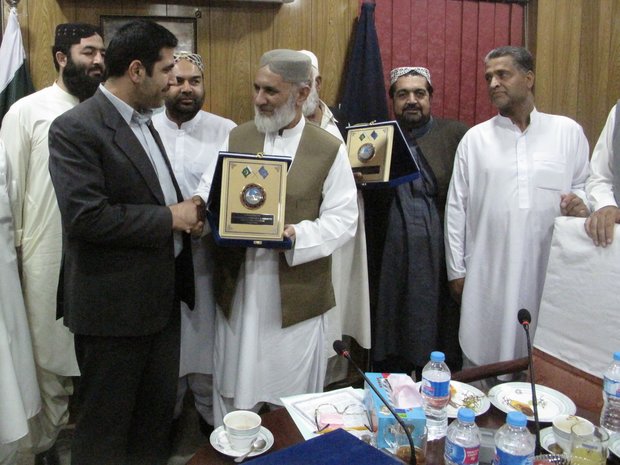
Abdul Waheed Achakza, the director of Quetta chamber of commerce, presents a memento to the Tehran Times correspondent on September 20, 2017.
For instance, they expected corresponding Iranian officials to lower import duties and taxes; reduce paperwork and bureaucracy in connection with bilateral trade as well as simplify regulations for issuing long-term visas to Pakistani traders and merchants.
Technical training institutes empower refugees
We stopped by the Technical and Vocational Training Institute, one of dynamic refugee camps in Muzaffarabad, to observe the daily life of tens of displaced people who had come from the so-called Indian-controlled Kashmir region.
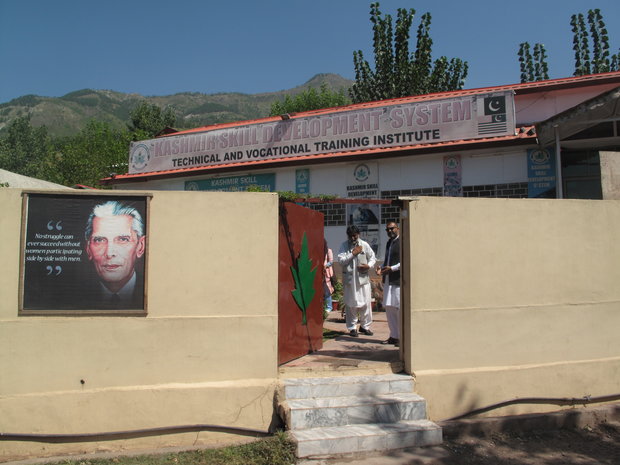
An exterior view of the Technical and Vocational Training Institute in Muzaffarabad
The two-story institute embraces several busy handicrafts workshops, a middle-sized library, a computer room, and exhibition spaces for showcasing handcrafted products. The money collected from the hand-made products goes directly back into their small community.
Much I learned from the refugees as they taught me life is what you make out of it even when you are in crisis.
Each room emanated a different feeling to me, as one, per se, was filled with all age women busy weaving carpets, while another room had men and women occupied tactfully making embroidery and handicrafts.
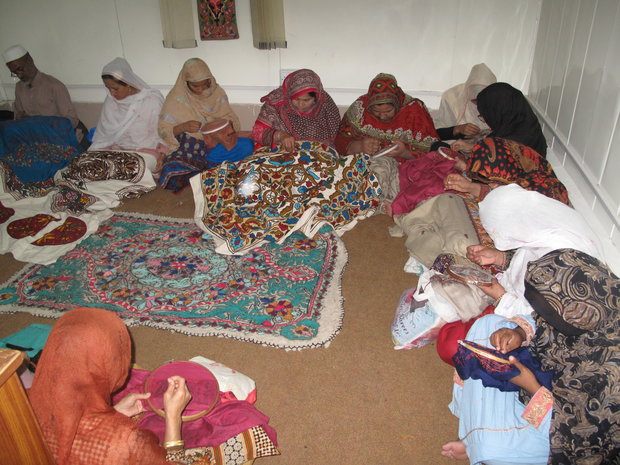
Ex-refugees are seen making handicrafts at the Technical and Vocational Training Institute in Muzaffarabad, September 19, 2017.
Muzaffarabad is the capital of Azad Jammu and Kashmir (AJK), situated on the confluence of the Jhelum and Neelum rivers. Azad Kashmir is divided into three divisions namely Muzaffarabad, Mirpur & Poonch as well as ten administrative districts.
Much I learned from the refugees as they taught me life is what you make out of it even when you are in crisis.
Life as is called in Line of Control, Chakothi
We were also taken to the Line of Control, Chakothi to be exact a border village in Hattian Bala District, located some 5o kilometers from Muzaffarabad near Pakistan-India border on bank of Jhelum River.
A once war-stricken region, now sees the light of the day. People live their life as they don’t recall sad, past times when bombs, shots and fires were pouring down on them.

Schoolchildren and the Tehran Times correspondent in Chakothi, September 19, 2017
What was very surprising to me was neatly-dressed school children returning home near the border line where abundant houses were constructed across the greenish landscape. Unbelievably, a calm region now that at some point in the past was subject to Indian-Pakistani bloody clashes.
And then it was dizzying-vast Gwadar Port
Another highlight of our journey was visiting the gigantic Gwadar Port which is under development based on the China–Pakistan Economic Corridor (CPEC) plan. The port is considered to be a link between the ambitious One Belt, One Road and Maritime Silk Road projects.
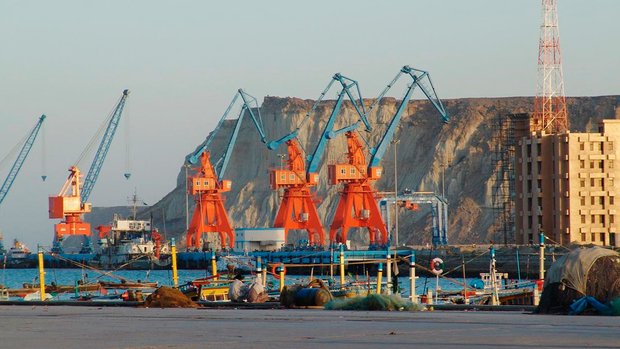
A view of the gigantic Gwadar Port in Pakistan
Then a meeting with the Gwadar Development Authority was followed, during which its director and other senior officials briefed the Iranian media delegation on the futures, plans and progresses in the scenic deep-sea port that is situated on the Arabian Sea in Balochistan province of Pakistan.
A once war-stricken region, now sees the light of the day. People live their life as they don’t recall sad, past times when bombs, shots and fires were pouring down on them.
Hospitable people
My appreciation for Pakistan deepened after mingling with many people we talked to during the journey, most of whom appeared to be very friendly.
In Quetta, where I was shopping for my son, eventually I got him a Spiderman doll, I met a shopkeeper who refused to take money from me once he found out I was visiting from Iran. Though, I ultimately paid him.
Almost every one we met and talked to along the way in Pakistan, highlighted our commonalities in terms of religious beliefs and culture.
On our flight to Quetta, we met a cool young man whose late father was used to be tribe chief. We later invited him to our hotel for more conversation and in return he invited all of us to a Chinese restaurant for the dinner.

A Pakistani bus with exciting and vibrant decoration called ‘folk art-form.’
To make a long story short, what I witnessed was a vibrant society with progressive citizens who were seemingly able to keep a good balance between their rich traditions, i.e. wearing their traditional clothing, and living a modern lifestyle.
My appreciation for Pakistan deepened after mingling with many people we talked to during the journey, most of whom appeared to be very friendly.
The media tend to be deceptive as they will portray a wrong image of some states on audience. But once you get to closely interact and know these people and their countries, you will come to get a different picture. That was the case about Pakistan for me.
But yes, the country is still developing and requires some time to come for a brighter future.
Decoding food in Pakistan
How can anyone write about Pakistan and not talk about its hot spicy dishes? Being a foodie, I fell in love with the country’s rich cuisine that has so much in common with ours in Iran, excluding their extravagant use of the pepper.
For instance, I was amazed at how skillful they are good at making kebabs which are very prevalent dish in Iran as well.
With temptations to overdo the eating and drinking soft beverages, I also realized that for me eating spices and hot chilies is entirely favorable in contrary to some of my compatriot colleagues.
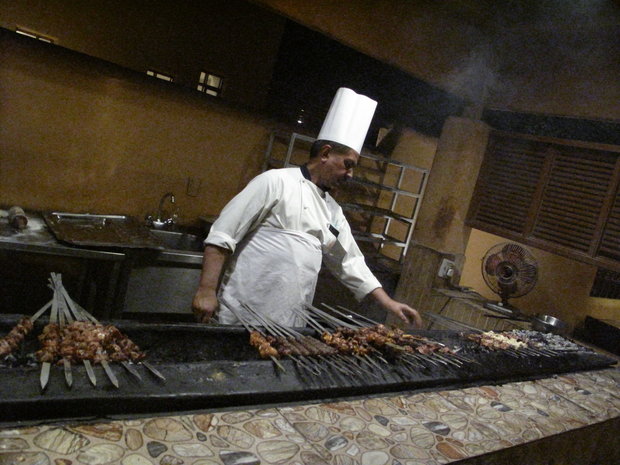
A chef roasts various kinds of meat over charcoals on the premises of the Quetta Serena Hotel, September 20, 2017.
A typical Pakistani breakfast usually contains cheese, dried nuts, honey, dates, olives, milk, eggs, and bread, with tea or coffee very close to that of ours at home.
In Pakistan, you realize that the nation’s cuisine varies greatly from region to region, reflecting the country’s ethnic and cultural diversity. In Quetta is, I got to pick out a pickled mango jar, something that tasted like nothing I had before, it worked out all my taste buds.
From a greater point of view, its rich cuisine is in fact an inheritor of Indo-Aryan culture and Muslim culinary traditions.
An amazing mosque with two minarets each in one state
While in Baluchistan, we also visited the Pakistani side of the Wesh–Chaman border crossing where several top military officials kindly briefed us on the hectic border and their vision for further development of the site.
We also took a peek into the landlocked Afghan territory while we were atop a three-story brick gate that is dividing the two states. On the top of its exterior facade, overlooking Baluchistan, two signs were reading “Proud Pakistani” and “Pakistan First” attracted many passersby attention. Adjacent to the gate was a tiny mosque with two minarets, one in Pakistan and the other in the Afghan soil.
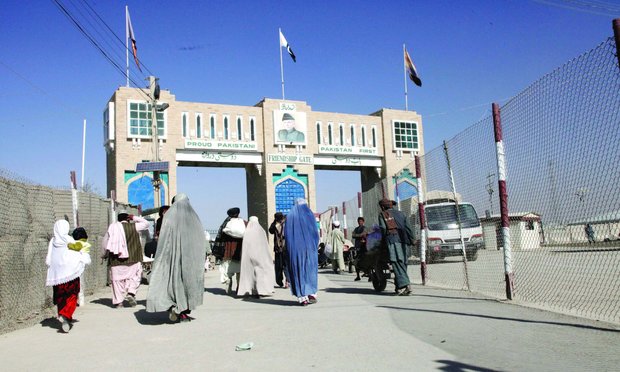
People crossing the Pakistani side of the Wesh–Chaman border
All in all, my travel to Pakistan was a once in a life time opportunity, one that I am extremely grateful for as I met extremely hospitable Pakistanis whom I will always remember for the rest of my life.
AFM/PA/MG/MJG
